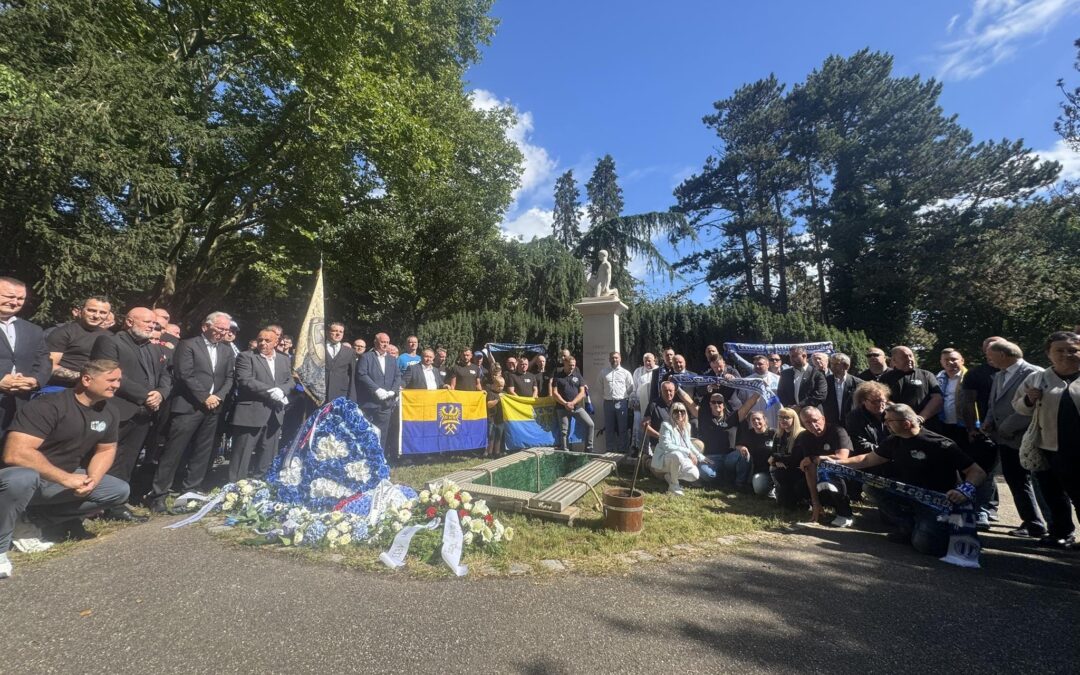Keep our news free from ads and paywalls by making a donation to support our work!

Notes from Poland is run by a small editorial team and is published by an independent, non-profit foundation that is funded through donations from our readers. We cannot do what we do without your support.
One of Poland’s greatest, but also most controversial, footballers, who during World War Two switched allegiance to Nazi Germany, has been reburied in a ceremony in the German city of Karlsruhe after his grave was saved by fans of his former Polish club from the threat of demolition.
Ernest Wilimowski died in Karlsruhe in 1997 at the age of 81. He was never able to return after the war to Poland, where he was widely regarded as a traitor (and continues to be seen that way by some Poles today).
Dziś w Karlsruhe odbył się pogrzeb ekshumowanego Ernesta Wilimowskiego.
Prezentujemy zdjęcia z tej wyjątkowej i podniosłej ceremonii.
➡️ https://t.co/ClWVwdG4X3 pic.twitter.com/gKQzJukxlg
— Ruch Chorzów (@RuchChorzow1920) August 30, 2025
In spring, reports emerged that his grave in Germany was set to be demolished due to plans by the local authorities to use part of the cemetery for other purposes. In response, fans of his former club in Poland, Ruch Chorzów, where Wilimowski is still idolised, launched a campaign to raise the €20,000 needed to relocate his grave.
On Saturday – the 28th anniversary of Wilimowski’s death – he was reburied in Karlsruhe in a funeral ceremony attended by his family members and Ruch fans, as well as the Chorzów mayor, Szymon Michałek, and Henryk Kula, president of the football association of the Silesia province in which Chorzów is located.
Outside the Hauptfriedhof cemetery, members of a Germany-based Ruch fan organisation held up a banner honouring the club and lit flares in its blue colours. During the burial ceremony, the yellow-and-blue flag of Upper Silesia was displayed.
“The fact that around a hundred people showed up at the funeral shows not only his greatness as a footballer, but also the greatness of Ruch Chorzów as a community,” said Michałek, quoted by Dziennik Zachodni, a local newspaper that supported the campaign to have Wilimowski reburied.
“Wilimowski has been laid to rest at the meeting point of three paths,” added the mayor. “His father was German, his mother Polish, and he described himself as Upper Silesian. We cannot all be put in the same box, and it was the same with Wilimowski.”
Kula, meanwhile, referred to the difficult situation many Silesians found themselves in after Poland was invaded and occupied by Nazi Germany in September 1939.
Many in Silesia – a historical region that has passed back and forth between German and Polish rule over the centuries – chose to take up the option of declaring allegiance to Germany as a means of survival.
“Many were thrown from Silesia to Germany during the war,” said Kula. “The war period prevented [Wilimowski] from shining or showcasing his full potential. Today he was given a dignified burial; he will have a dignified place.”
Grzegorz Joszko, a historian who works for Ruch Chorzów, told the Polish Press Agency (PAP) that the costs of the reburial had been covered by the local authorities in Karlsruhe and the German and Silesian football associations, in addition to the public fundraising efforts.
But that campaign has drawn criticism from some Polish right-wing politicians. Wilimiowski “betrayed Poland in 1939”, said Law and Justice (PiS) MP Paweł Jabłoński earlier this year.
“He played in a shirt with a swastika on his chest and took money from the Germans while his teammates from the Polish national team were being murdered by those Germans.”
A Polish football club has launched a campaign to save the grave of one of Poland’s best ever footballers, Ernest Wilimowski, which is under threat of demolition
That has stirred controversy given that Wilimowski switched allegiance to Nazi Germany in WW2 https://t.co/S3EG5RxoWw
— Notes from Poland 🇵🇱 (@notesfrompoland) April 9, 2025
Wilimowski was one of the greatest footballers of his generation – not just in Poland, but globally. He scored 21 goals in 22 games for Poland between 1934 and 1939, including four in one match against Brazil at the 1938 World Cup – prompting a number of Brazilian clubs to try, unsuccessfully, to sign him.
However, his legacy is now shrouded in controversy because, during the war, he declared allegiance to Nazi Germany and played six times for its national team.
In recent years, attitudes towards Wilimowski in Poland have softened, with the Polish football association now paying tribute to him on its website. A 2023 poll by website Sportowe Fakty found that a majority, 57%, of readers believed Wilimowski “should be rehabilitated in the history of Polish football” while 43% did not.
Traitor or legend? How one Poland’s greatest footballers ended up playing for Nazi Germany https://t.co/mJHWoLW2V6
— Notes from Poland 🇵🇱 (@notesfrompoland) January 7, 2025

Notes from Poland is run by a small editorial team and published by an independent, non-profit foundation that is funded through donations from our readers. We cannot do what we do without your support.
Main image credit: Paweł Czado/Facebook

Daniel Tilles is editor-in-chief of Notes from Poland. He has written on Polish affairs for a wide range of publications, including Foreign Policy, POLITICO Europe, EUobserver and Dziennik Gazeta Prawna.



















